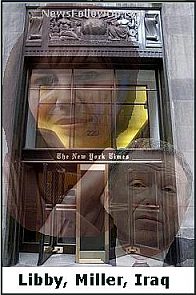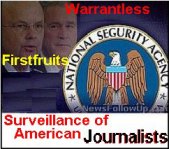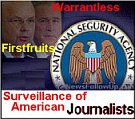-
WMR October
14, 2010 --
How CNN was taken over by
the neocons ...
The demise of CNN and its hostile takeover by neo-conservatives who turned
CNN News into an echo chamber for Israel supporters and neocons and Headline
News into a tabloidish concoction of crap news was brought about by a
concerted effort by Time Warner executives to embarrass CNN founder Ted
Turner and force him out of the corporate leadership, according to informed
sources in Atlanta who spoke to WMR. ...
Ted Turner made his professionally-fatal mistake of merging CNN with Time
Warner in 1996. Turner resigned as vice chairman of the merged AOL Time
Warner in 2003. Turner lost some $7 billion in stock after the merger in
1996 but his financial losses would soon grow larger.
... In 1998, Time Warner, according to our Atlanta sources,
convinced CNN to run a story about Operation Tailwind, a covert U.S.
military and South Vietnamese Montagnard incursion into Laos from September
11 to 13, 1970, that was designed to put pressure on North Vietnamese troops
during a Laotian Army offensive. CNN ran a "Newstand CNN & Time" story
called "Valley of Death," narrated by CNN correspondent Peter Arnett with
lead CNN producer April Oliver, in cooperation with Time magazine, that
reported that US forces used sarin gas in Laos between 9/11 and 9/13, 1970.
CNN reported that 100 Laotian villagers were killed by a US sarin gas
attack. ... WMR has learned that
in an operation similar to the setting up of CBS Dan Rather in the George W.
Bush Texas Air National Guard AWOL story, bogus elements were introduced
into an otherwise legitimate story on Operation Tailwind. Moreover,
according to our sources in Atlanta, the bogus elements were known to
certain executives of CNN and Time Warner with the intention of weakening
CNN to the point where its executive management could be fired and replaced
with those who would steer the pre-eminent news network to the right in all
respects, including strong support for Israel in its Middle East coverage.
It was CNN-US President Rick Kaplan who pushed the Tailwind story over the
objections of several CNN news veterans. Kaplan is now the executive
producer of the CBS Evening News with Katie Couric in the anchor chair once
occupied by Rather. ... As with the CBS
60 Minutes story on Bush's AWOL status that was reported by Rather, CNN
named an investigation panel to examine the facts of the story after the
Pentagon stated that no sarin gas was ever used and the story was false.
Ultimately, CNN agreed that there were several factual errors in the story
and issued a retraction. Some military experts suggested that while CS tear
gas may have been used in Tailwind, sarin was somehow substituted in the
story, resulting in the controversy and retraction. Former Joint Chiefs of
Staff chairman Admiral Thomas Moorer claimed he was erroneously quoted about
sarin being used in Laos. ... Producers Oliver
and Jack Smith were fired after the retraction and Arnett left the network
after being formally reprimanded. Arnett briefly joined HDNet, the same
network that hired Rather after his departure from CBS News. CNN President
Tom Johnson left CNN a few years later. ...
CNN was faced with law suits from Tailwind veterans. Turner, who lost
several billions in stock after the merger with Time Warner in 1996, saw the
company's stock take a further hit as a result of the Tailwind debacle. The
stock value loss weakened Turner's financial interest in the firm, making it
more vulnerable for a buyout. Turner would see Time Warner and its chairman
Gerald Levin, a heavy donor to Jewish causes, exercise more control over the
editorial direction of CNN. After the disastrous Time Warner merger with AOL
in 2000, CNN, as it was originally envisaged by Turner when he founded the
world's first global cable news network, was a thing of the past. CNN's
editorial direction saw correspondent Wolf Blitzer, formerly a public
affairs spokesman for the American Israel Public Affairs Committee (AIPAC),
assume dominant anchor responsibilities for CNN's influential Washington
bureau after first becoming a CNN anchor in 1999 and moving up the ranks to
hosting the three-hour Situation Room in 2005. ...
The recent firings of CNN Middle East editor Octavia Nasr and news anchor
Rick Sanchez capped off the slow drift of CNN to becoming a propaganda
outlet for Israel and the Israel Lobby in the United States. CNN announced
that in its move to help rehabilitate former New York Governor Eliot
Spitzer, forced from office over a prostitution scandal, would co-host a
program in Sanchez's time slot. CNN Washington is now essentially a Blitzer
and Spitzer operation. ... The lesson of the
demise of CNN is a textbook case of how special interests have and will
continue to dictate news content and reporting in the United States. After
the recent verbal attack by Broadcasting Board of Governors chairman Walter
Isaacson, the managing editor of Time during the Tailwind episode and, from
2001 to 2003, the chairman and CEO of CNN, on the expanding independent
global news networks of RT [Russia Today], Telesur of Venezuela, Iran's
Press TV, and a planned Chinese network as "enemies" of America, these and
other embryonic networks like Turkey's TRT English network, should take note
of the downfall of CNN and the players who engineered it. Forewarned is
forearmed.
- April 7-8, 2011 --
Journalists colluding with the
government? While WMR rarely defends the
so-called "main stream media," this will be a major exception.
The Center for Public
Integrity (CPI), a Washington, DC-based watchdog group, recently floated a
story that Chris Isham, the CBS News Washington, DC bureau chief since 2007,
and before that, the chief investigative producer for the late Peter
Jennings's ABC World News Tonight in New York, was a "snitch" for the FBI
after the 1995 bombing of the Murrah Federal Building in Oklahoma City.
... Isham, who, it should be
noted, in the interest of full disclosure, that I have met on a few
occasions, now stands accused in the court of some public opinion of being
an FBI rat. But the CPI story about Isham may have another motive during the
same week the Anti-Defamation League (ADL), the extremist right-wing Jewish
organization, is holding its National Leadership Conference in Washington.
... Isham, according to the CPI report, passed a
tip, which turned out to have originated from a suspicious Saudi source,
that erroneously held Iraq's Saddam Hussein responsible for the Oklahoma
City bombing. In fact, there was no Arab connection to Oklahoma City,
although certain circles, including Isham's competitor and Israel Lobby
hack, former CNN investigative reporter Stephen Emerson, attempted to spin
that story. ... But there mere
fact that the Isham story "broke" the same week that the ADL was holding its
annual conference in Washington raises red flags all over the place.
... Isham reportedly received the Saudi tiip from former
CIA counter-terrorism chief Vince Cannistraro, a consultant for ABC News
while Isham was chief investigative producer for Jennings in New York. Isham
also maintained close ties with John O'Neill, the chief of the FBI's
counter-terrorism unit at the time. In all likelihood, Isham's tip resulted
in an over-zealous FBI agent, maybe even with O'Neill's concurrence, placing
the ABC News producer on the FBI's informant list. While it is never a
comfortable situation for a reporter to be considered an informant by any
government agency, whether it be the FBI or CIA, it does not appear that
Isham had any control or even knowledge about the FBI's decision.
.... A few days after 9/11, this editor passed to an FBI
official a tip on two shady characters who were transferring from an
international flight at New York's JFK airport two days before the 9/11
attacks. The two were acting strangely at JFK's departure lounge before we
boarded an American Airlines commuter flight to Washington's Dulles
International. Later, the FBI official thanked me for my information and
stated that the Joint Terrorism Task Force in New York found it "useful."
For that act, I may, like Isham, be on an FBI informants list.
... The CPI report on Isham, which this editor considers
to be more propaganda than journalism, may be a "pay back" for a major ANC
News investigative story on the ADL in 1993. That year, Isham and ABC News
Washington chief investigative producer James Bamford broke a story on a
major espionage operation being conducted by the ADL against American
citizens on the right and left of the political spectrum. The on-air
reporter forthe ADL spying story was James Walker, the nephew of George H.
W. Bush. ... Targeted by the ADL
were groups opposed to Israeli policies in Palestine, U.S. policies in
Central America, anti-South African apartheid groups, labor unions, gay
rights organizations, and African-American groups. Among the targets were
the National Association for the Advancement of Colored People (NAACP),
Greenpace, KQED-TV San Francisco, the anti-abortion Operation Rescue, and
the United Farm Workers. Individuals targeted by the ADL included former
Representative Pete McCloskey (D-CA), perennial presidential candidate
Lyndon LaRouche, and Los Angeles Times South Africa correspondent Scott
Kraft. In all, 950 groups were being spied on by the ADL, as well as at
least 12,000 individuals. .... The
top ADL spy on the West Coast, Roy Bullock, a Castro District, San Francisco
art dealer, was exposed as the ADL's chief gatherer of intelligence on
American citizens. Bullock was paid via laundered ADL money transfers to
Bruce Hochman, a Beverly Hills attorney, former federal prosecutor, and
former president of the Jewish Federation Council of Greater Los Angeles.
The Los Angeles Times reported that the ADL's Los Angeles regional director,
David Lehrer, aka "L. Patterson," was also involved in the secret slush fund
used to pay for the collection of intelligence on West Coast groups and
individuals. In April 1993, Los Angeles and San Francisco police conducted
searches of ADL offices in Los Angeles and San Francisco. Bullock obtained
his files on groups and individuals by conducting everything from "dumpster
diving" to paying Tom Gerard, a former CIA agent who became a San Francisco
police inspector, for information, including wiretap records, gathered from
government files. Like convicted Israeli spy Jonathan Pollard, Bullock was
spying for both the Israelis and South Africa's apartheid regime.
.... Isham pursued the Gerard lead to the Philippines
where the San Francisco cop fled after being questioned by the FBI. Gerard
left behind in San Francisco fake passports, foreign identity cards, and
drivers' licenses. Isham's ABC team tracked the money payments to the ADL in
Los Angeles and San Francisco back to the ADL's national headquarters in New
York. Other ADL spying operations were discovered in Chicago and Atlanta. In
breaking the story on the involvement of the top leadership of the ADL in
the espionage operation, ABC stated, "for several decades the spying
operation has snooped into the records and activities of more than 10,000
people in the United States, including many who simply opposed the policies
of Israel and South Africa . . . the leader of the intelligence ring is
Irwin Suall." Suall was head of ADL New York's 15-member "research unit."
Ultimately, Suall, said to be an "ex-Marxist," reported to ADL President Abe
Foxman. The ADL spying operation was located at the ADL's 605 Third Avenue
headquarters in mid-town Manhattan, not far from UN headquarters.
.... There is even reason to believe that Isham's boss,
Jennings, the network's one-time Middle East correspondent who was known to
be a friend of Palestine Liberation Organization spokeswoman Hanan Ashrawi,
was also a subject in the ADL's espionage files. ...
ABC caught tremendousheat fromthe ADL for its story and was referred to as
the "Arab Broadcasting Company." ...
The release of the disparaging report about Isham the same week that Shimon
Peres is in Washington demanding the release of Pollard and retraction of
the UN's Goldstone Report on Israeli targeting of civilians during OPERATION
CAST LEAD in Gaza, comes at the same time Israel is engaging in a major
propaganda blitz worldwide. A "score settling" with Isham may be yet another
attempt by the Israel Lobby to stifle criticisms by media figures of the
Israeli regime. After the treatment of Hearst Newspapers' Helen Thomas and
CNN's Rick Sanchez and Octavia Nasr, Chris Isham may be the latest target in
Israel's attempt to purge its perceived opponents from American newsrooms
and editorial offices. ...
As a Vice President for CBS News and the news network's DC bureau chief,
Isham is constrained about what he can say on the matter. WMR has no such
constraints, however. ... In
Washington, timing is everything and the Isham "hit piece" appearing the
same week as the ADL was meeting in Washington to formulate its propaganda
strategy for the coming year does not pass any smell test, kosher or
otherwise. ... ----
Postscript: There have been numerous times when journalists have shamelessly
colluded with the government. Cases where such collusion takes place usually
involves top media and government officials. Take, for instance, Washington
Post senior columnist Joseph Alsop V's collusion with President Lyndon
Johnson to keep the lid on any full blown investigation by independent
experts from outside Texas on investigating the assassination of President
John Kennedy in Dallas just a few days prior. Johnson told Alsop in a
November 25, 1963 phone conversation, that he wanted no "carpetbaggers"
coming to Texas to interfere with his own plan: the establishment of a blue
ribbon panel packed with LBJ cronies to issue a report on the assassination.
Alsop mentioned that Fred Friendly, President of CBS News, and former
Secretary of State Dean Acheson were party to a planned cover-up of the
investigation in order to deter any suspicion about Johnson's role in the
assassination matter. Alsop's collusion with Johnson remains a shocking
example of media collusion with the government.
|
![]() = go
to NFU page
= go
to NFU page



